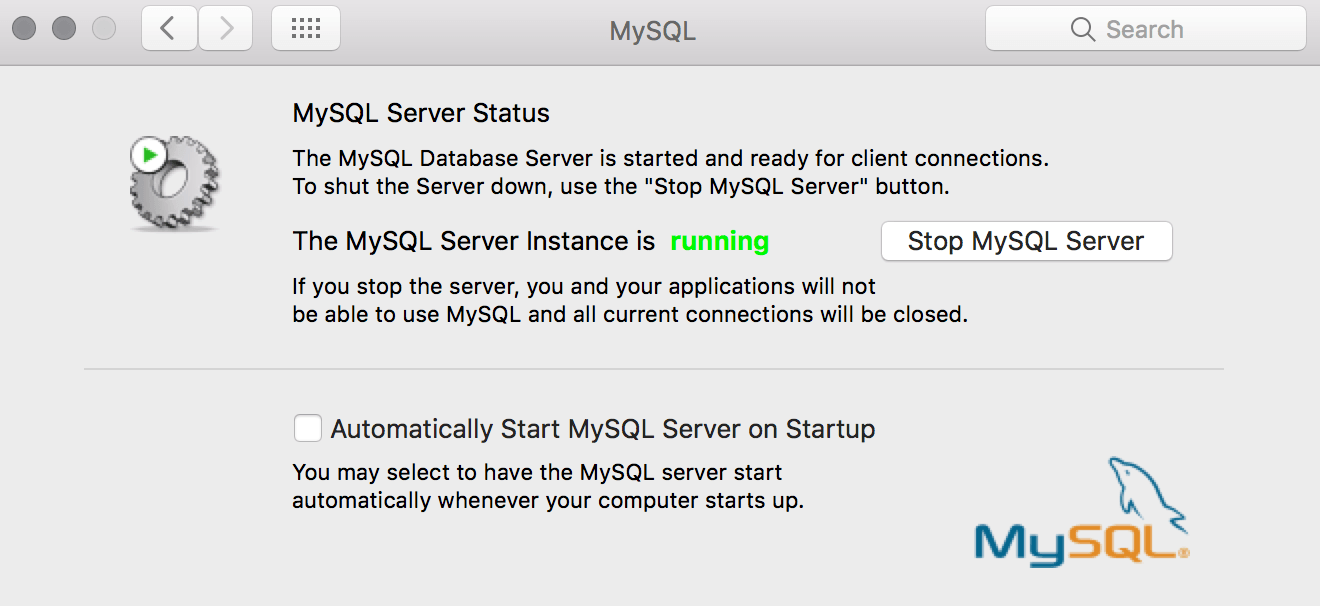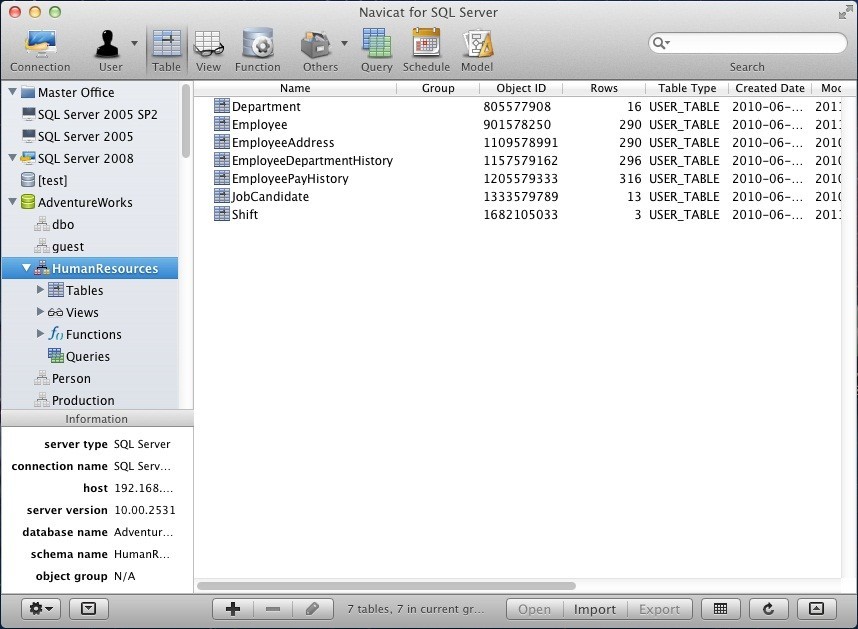Postgres.app is a full-featured PostgreSQL installation packaged as a standard Mac app.It includes everything you need to get started:we’ve even included popular extensions like PostGIS for geo data and plv8 for JavaScript.
- Sequel Pro is a fast, easy-to-use Mac database management application for working with MySQL databases. Sequel Pro gives you direct access to your MySQL Databases on local and remote servers. License: Freeware Developer/Publisher: Sequel Pro Team, CocoaMySQL team Modification Date: April 2, 2016 Requirements: Mac OS X 10.6 or higher - 64-bit.
- Oracle Database 11g Release 2 Express Edition for Linux x86 and Windows; Software Delivery Cloud. Oracle also provides all supported database release software for all platforms on the Oracle Software Delivery Cloud: Previous Database Release Software. Oracle Database 10.2 and 11.1 are no longer available for download.
Postgres.app has a beautiful user interface and a convenient menu bar item.You never need to touch the command line to use it – but of course we do include all the necessary command line tools and header files for advanced users.
IDatabase for Mac Easily create databases, inventories, collections and item lists. IDatabase is the Mac app that simplifies the creation of databases, inventories, collections and lists of items. IDatabase is the best there is for those who want to manage, store and quickly find any information for their passions and for everyday work. Oracle Database 11g Release 2. Standard Edition, Standard Edition One, and Enterprise Edition. 7/13: Patch Set 11.2.0.4 for Linux and Solaris is now available on support.oracle.com.Note: it is a full installation (you do not need to download 11.2.0.1 first).
Postgres.app can install minor updates automatically, so you get bugfixes as soon as possible.
Installing Postgres.app
Download ➜ Move to Applications folder ➜ Double Click
If you don't move Postgres.app to the Applications folder, you will see a warning about an unidentified developer and won't be able to open it.
Click 'Initialize' to create a new server
Configure your $PATH to use the included command line tools (optional):
Done! You now have a PostgreSQL server running on your Mac with these default settings:

| Host | localhost |
| Port | 5432 |
| User | your system user name |
| Database | same as user |
| Password | none |
| Connection URL | postgresql://localhost |
To connect with psql, double click a database. To connect directly from the command line, type psql. If you’d rather use a graphical client, see below.
NOTE: These instructions assume that you’ve never installed PostgreSQL on your Mac before.If you have previously installed PostgreSQL using homebrew, MacPorts, the EnterpriseDB installer, consider removing other PostgreSQL installations first.We also have instructions for upgrading from older versions of Postgres.app.
Graphical Clients
Postgres.app includes psql, a versatile command line client for PostgreSQL.But it’s not the only option; there are plenty of great graphical clients available for PostgreSQL.Two popular tools are:
pgAdmin 4 is a feature rich open source PostgreSQL client.It has support for almost every feature in PostgreSQL.The only downside is that the cross-plattform UI really doesn’t live up to the expectations of a native Mac app.
Postico on the other hand, is a very modern Mac app.It’s made by the same people that maintain Postgres.app, and we think you’ll like it! We put a lot of effort into making it a joy to use.However, it doesn’t have the extensive feature set of pgAdmin, and it’s a commercial app rather than open source.
Aside from those two options, there are a lot more to choose from! Check the documentation for a list of amazing Mac apps for PostgreSQL.
How to connect
After your PostgreSQL server is up and running, you’ll probably want to connect to it from your application.Here’s how to connect to PostgreSQL from popular programming languages and frameworks:
To connect from PHP, make sure that it supports PostgreSQL. The version included with macOS doesn't support PostgreSQL. We recommend MAMP for an easy way to install a current version of PHP that works.
You can use PDO (object oriented):
Or the pg_connect() functions (procedural):
To connect to a PostgreSQL server with Python, please first install the psycopg2 library:
Django
In your settings.py, add an entry to your DATABASES setting:
Flask
When using the Flask-SQLAlchemy extension you can add to your application code:
SQLAlchemy
To install the pg gem, make sure you have set up your $PATH correctly (see Command-Line Tools), then execute the following command:
Rails
In config/database.yml, use the following settings:
Sinatra
In config.ru or your application code:
ActiveRecord
Install the activerecord gem and require 'active_record', and establish a database connection:
DataMapper

Install and require the datamapper and do_postgres gems, and create a database connection:
Sequel
Install and require the sequel gem, and create a database connection:
- Download and install the PostgreSQL JDBC driver
- Connect to the JDBC URL jdbc:postgresql://localhost
For more information see the official PostgreSQL JDBC documentation.
libpq is the native C client library for connecting to PostgreSQL. It's really easy to use:
Now compile the file with clang and run it:
You can just use the C API in Swift! First include libpq in your bridging header:
Then make sure to link with libpq.
On iOS, you'll need to build libpq yourself.
On macOS you can use the system provided libpq (does not support SSL) or use libpq provided by Postgres.app by adding the following build settings:
| Other Linker Flags | -lpq |
|---|---|
| Header Search Paths | /Applications/Postgres.app/Contents/Versions/latest/include |
| Library Search Paths | /Applications/Postgres.app/Contents/Versions/latest/lib |
Now you can use the libpq C library to connect to PostgreSQL:
Support
We have a list of common problems in the troubleshooting section in the documentation.
For general questions concerning PostgreSQL, have a look at the official PostgreSQL documentation.
If you have a question concerning Postgres.app that is not answered by the Postgres.app documentation,you can ask @PostgresApp on Twitter, or open an issue on GitHub.
Database For Mac Free Download
When reporting bugs, let us know which version of Postgres.app & macOS you are using, and be sure to include detailed error messages, even if your issue seems similar to another one.
License
Postgres.app, PostgreSQL, and its extensions are released under the PostgreSQL License. The released binaries also include OpenSSL (OpenSSL License), PostGIS (GPLv2), and plv8 (3 clause BSD).
Postgres.app is maintained by Jakob Egger. It was originally created by Mattt Thompson.
Access is a Microsoft database, porting away from it may be a nightmare.
First, tell us why you are wanting to move to a different database platform. (Need the end goal to figure out how to do it)
What compliance standards do you have to adhere to? PCI, HIPAA, etc.
Access For Mac
What are ALL of the platforms you need the database to work on?
PC/Mac/Android/iPhone/WindowsPhone/Web?
I highly recommend posting your question on the SpiceWorks forums as this is something IT specialists know what to do and how to go about it. I am a member there and will offer any guidance as well. http://community.spiceworks.com/
Database For Macbook
Lastly, Apple owns FileMaker which is a Mac/PC-friendly database system. While waiting for the IT pros to assist with a plan, call the team at Filemaker and see what they can do for you. http://www.filemaker.com/
Sql Database For Mac
Jul 2, 2015 12:55 PM
Comments are closed.